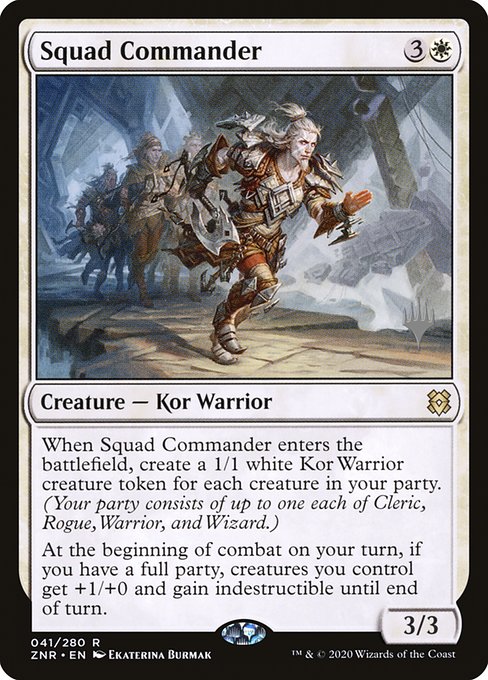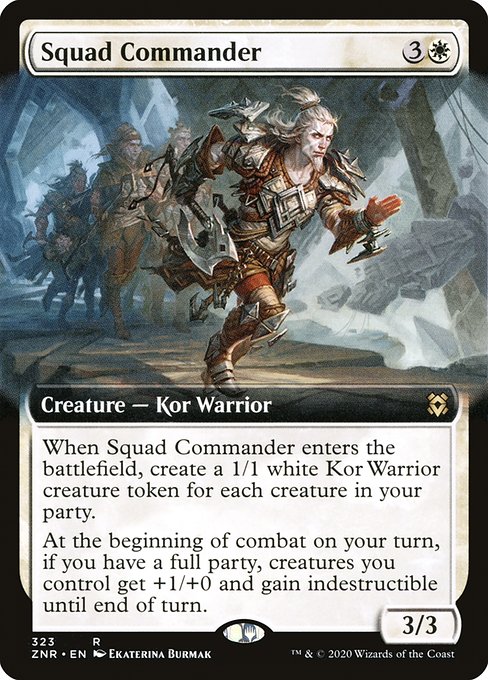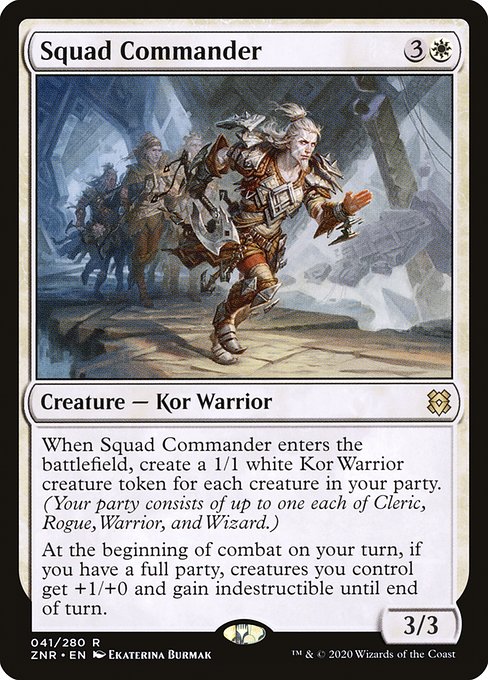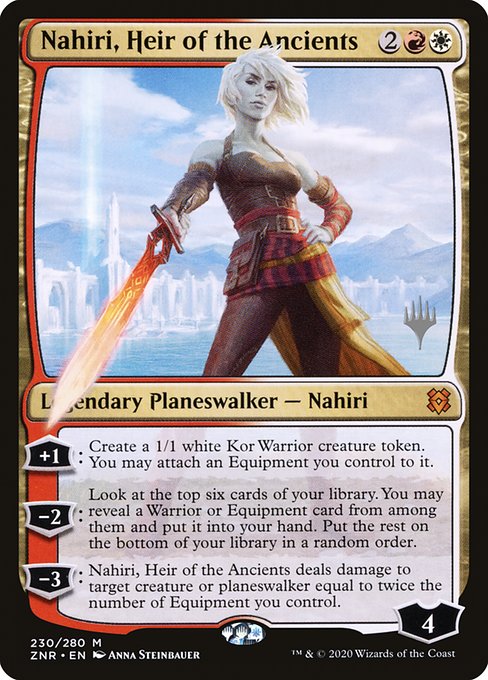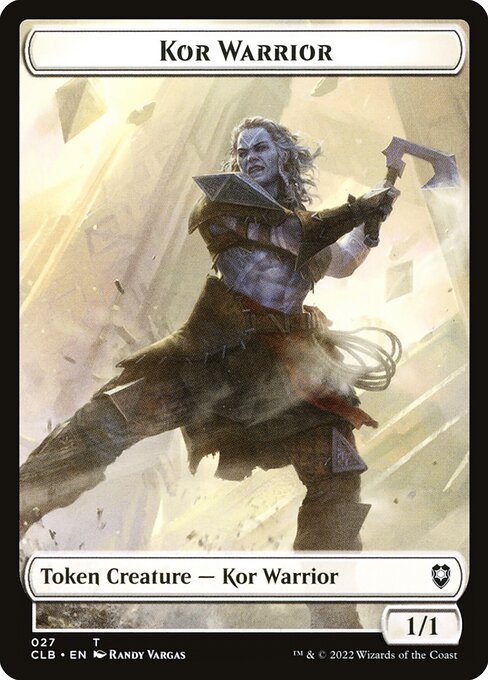Comandante de la brigada
Criatura — Guerrero kor
Cuando el Comandante de la brigada entre al campo de batalla, crea una ficha de criatura Guerrero Kor blanca 1/1 por cada criatura en tu grupo. (Tu grupo consiste en hasta un Clérigo, un Bribón, un Guerrero y un Hechicero.)
Al comienzo del combate en tu turno, si tienes un grupo completo, las criaturas que controlas obtienen +1/+0 y ganan la habilidad de indestructible hasta el final del turno.
Al comienzo del combate en tu turno, si tienes un grupo completo, las criaturas que controlas obtienen +1/+0 y ganan la habilidad de indestructible hasta el final del turno.
3/3
standard
future
historic
gladiator
pioneer
explorer
modern
legacy
pauper
vintage
penny
commander
brawl
alchemy
paupercommander
duel
oldschool
premodern
Rulings
Once Squad Commander's last ability has resolved, the affected creatures won't lose +1/+0 or indestructible if you no longer have a full party.
An ability referring to the number of creatures in your party gets a number from zero to four. Such abilities never ask which creatures are in your party, and you never have to designate specific creatures as being in your party. You can't choose to exclude creatures from this count to lower the number.
If a creature has more than one party creature type, and there are multiple ways to count that creature that could result in a different number of creatures in your party, the highest such number is used. For example, if you control a Cleric and a Cleric Wizard, the number of creatures in your party is two. You can't choose to have it be just one by counting the Cleric Wizard first as a Cleric.
If an ability of a creature counts the number of creatures in your party, that number is counted as the ability resolves. If that creature is still on the battlefield when the ability resolves, it'll be counted if appropriate.
Squad Commander's last ability affects only creatures you control at the time it resolves. Creatures you begin to control later in the turn won't get +1/+0 or gain indestructible.
Some cards refer to you having a “full party.” This is true if the number of creatures in your party is four.
To determine “the number of creatures in your party,” check whether you control a Cleric, whether you control a Rogue, whether you control a Warrior, and whether you control a Wizard. The number is the total number of those checks to which you answered yes. Each creature you control can be counted for only one of those checks.
An ability referring to the number of creatures in your party gets a number from zero to four. Such abilities never ask which creatures are in your party, and you never have to designate specific creatures as being in your party. You can't choose to exclude creatures from this count to lower the number.
If a creature has more than one party creature type, and there are multiple ways to count that creature that could result in a different number of creatures in your party, the highest such number is used. For example, if you control a Cleric and a Cleric Wizard, the number of creatures in your party is two. You can't choose to have it be just one by counting the Cleric Wizard first as a Cleric.
If an ability of a creature counts the number of creatures in your party, that number is counted as the ability resolves. If that creature is still on the battlefield when the ability resolves, it'll be counted if appropriate.
Squad Commander's last ability affects only creatures you control at the time it resolves. Creatures you begin to control later in the turn won't get +1/+0 or gain indestructible.
Some cards refer to you having a “full party.” This is true if the number of creatures in your party is four.
To determine “the number of creatures in your party,” check whether you control a Cleric, whether you control a Rogue, whether you control a Warrior, and whether you control a Wizard. The number is the total number of those checks to which you answered yes. Each creature you control can be counted for only one of those checks.
Rulings
Once Squad Commander's last ability has resolved, the affected creatures won't lose +1/+0 or indestructible if you no longer have a full party.
An ability referring to the number of creatures in your party gets a number from zero to four. Such abilities never ask which creatures are in your party, and you never have to designate specific creatures as being in your party. You can't choose to exclude creatures from this count to lower the number.
If a creature has more than one party creature type, and there are multiple ways to count that creature that could result in a different number of creatures in your party, the highest such number is used. For example, if you control a Cleric and a Cleric Wizard, the number of creatures in your party is two. You can't choose to have it be just one by counting the Cleric Wizard first as a Cleric.
If an ability of a creature counts the number of creatures in your party, that number is counted as the ability resolves. If that creature is still on the battlefield when the ability resolves, it'll be counted if appropriate.
Squad Commander's last ability affects only creatures you control at the time it resolves. Creatures you begin to control later in the turn won't get +1/+0 or gain indestructible.
Some cards refer to you having a “full party.” This is true if the number of creatures in your party is four.
To determine “the number of creatures in your party,” check whether you control a Cleric, whether you control a Rogue, whether you control a Warrior, and whether you control a Wizard. The number is the total number of those checks to which you answered yes. Each creature you control can be counted for only one of those checks.
An ability referring to the number of creatures in your party gets a number from zero to four. Such abilities never ask which creatures are in your party, and you never have to designate specific creatures as being in your party. You can't choose to exclude creatures from this count to lower the number.
If a creature has more than one party creature type, and there are multiple ways to count that creature that could result in a different number of creatures in your party, the highest such number is used. For example, if you control a Cleric and a Cleric Wizard, the number of creatures in your party is two. You can't choose to have it be just one by counting the Cleric Wizard first as a Cleric.
If an ability of a creature counts the number of creatures in your party, that number is counted as the ability resolves. If that creature is still on the battlefield when the ability resolves, it'll be counted if appropriate.
Squad Commander's last ability affects only creatures you control at the time it resolves. Creatures you begin to control later in the turn won't get +1/+0 or gain indestructible.
Some cards refer to you having a “full party.” This is true if the number of creatures in your party is four.
To determine “the number of creatures in your party,” check whether you control a Cleric, whether you control a Rogue, whether you control a Warrior, and whether you control a Wizard. The number is the total number of those checks to which you answered yes. Each creature you control can be counted for only one of those checks.
Your collection? Your decks?
Want to manage your collection and/or create decks?
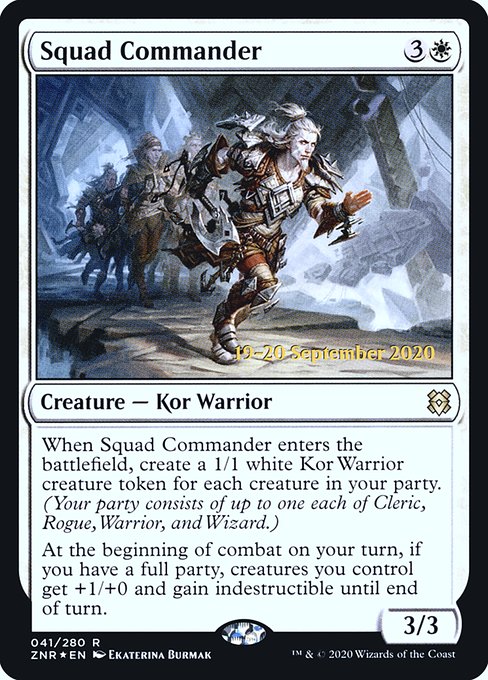

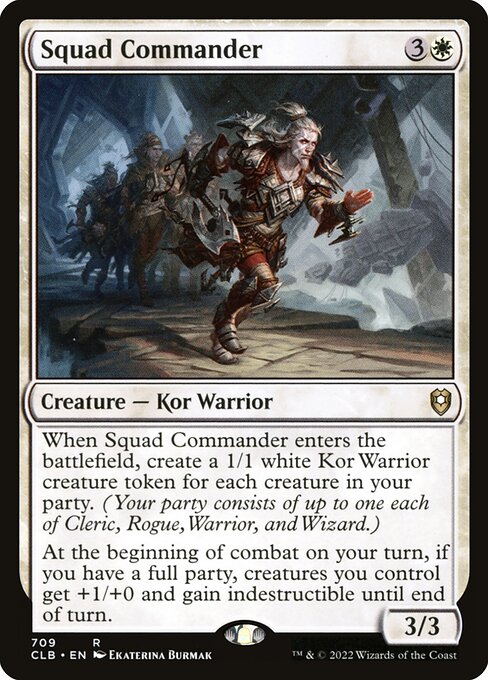
 0
0
 0.13€
0.13€
